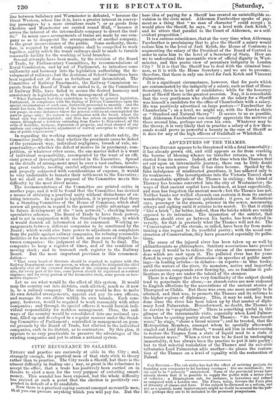ADVENTURES OF THE THAMES.
Tereares-Reeoini appears to be threatened with a fatal immortality : it has already grown old, and still appears as far from reaching the bourne of blessing whence no traveller returns, as when it started from its source. Indeed, at the time when the Thames first set out upon an interminable journey, there can be little doubt that it was much purer than it has since become. Spoiled by the false indulgence of misdirected guardians, it has adhered only to its weaknesses. The investigations into the Victoria Tunnel show the remarkable aptitude of the Thames in sinking; the island of Thorney has become converted into the city of Westminster; the ways of that ancient capital have hardened, at least superficially, and man has forgotten the ancient marsh ; but the Thames has not. Neither banks nor walled channels can restrain it from its ancient wanderings in the primmval quicksands ; it goes, as Metastasio says, passenger in the stream, prisoner in the sewer, murmuring always and sighing until it returns to its marsh. To that it sticks "like a brick "; far better, indeed, than the bricks which are vainly opposed to its intrusion. The injunction of the satirist, that Thames should ever go between his banks, has been obeyed in- versely, for that is precisely what the Thames will not do. The " Conservators " of the stream, so called, have been far from main- taining a due regard to its youthful purity ; with the usual con- struction of Conservatism, they have preserved especially its pollu- tions.
The cause of the injured river has been taken up as well by philanthropists as philosophers. Sanitary associations have proved how easy it would be to relieve the stream of the nauseous bur- dens which are cast upon it. The polluted river has for years flowed in every species of discussion—in speeches at public meet- ings—in leading articles—in debates—in reports—in blue books; until the waters of the river, its monsters, native and imported, its extraneous compounds ever flowing by, are as familiar in pub- lications as they are under the tafrail of the steamer. There is a danger that the very familiarity of the subject should tend to perpetuate the abuse,—as church-rates are now endeared to English affections by the associations of the ancient stories of Thorogood or Childs. But there was even one more security to be attained, and that was, to promote the Thames and its reforms to the higher regions of diplomacy. This, it may be said, has been done since the river has been taken up by that master of diplo- macy Lord Palmerston. Henceforward, no doubt, the Thames is to survive in "negotiations." There is something awful in this glimpse of the interminable vista, especially when Lord Palmer- ston takes to quoting poetry about the Thames : "its translucent wave," be sings "shone a broad mirror"; and he trusted, that the
Metropolitan sings, amongst whom he specially afterwards singled out Lord Dudley Stuart, "would aid him in endeavouring to restore the Thames from a state of liquid mud to a state of translucent wave." When a river was to be fixed in unchanging immortality, it has always been the practice to put it into poetry ; but to that celestial translation of the Thames and its sub civic tributaries Lord Palmerston adds another—he places the restora- tion of the Thames on a level of equality with the restoration of Poland.
CAB REFORM—The cab strike has had the effect of reviving projects for founding new companies to let hackney carriages: five are mentioned ; two are said to be " seriously " entertained. Some of the provincial towns have already shown that it is possible to supply the public with a better class of vehicles : a Birmingham cab, for instance, is luxurious and refined as compared with a London one. The Times, today, favours the Paris plan of diversity of classes and fares. If the subject be discussed as a reform, and not as a quarrel, man/ improvements might no doubt be secured for the pub- lic; perhaps they are to be included in the promised prospectuses.


























 Previous page
Previous page